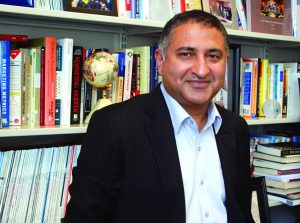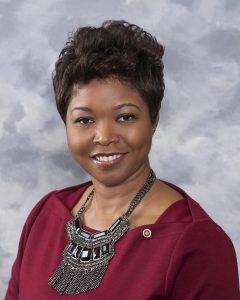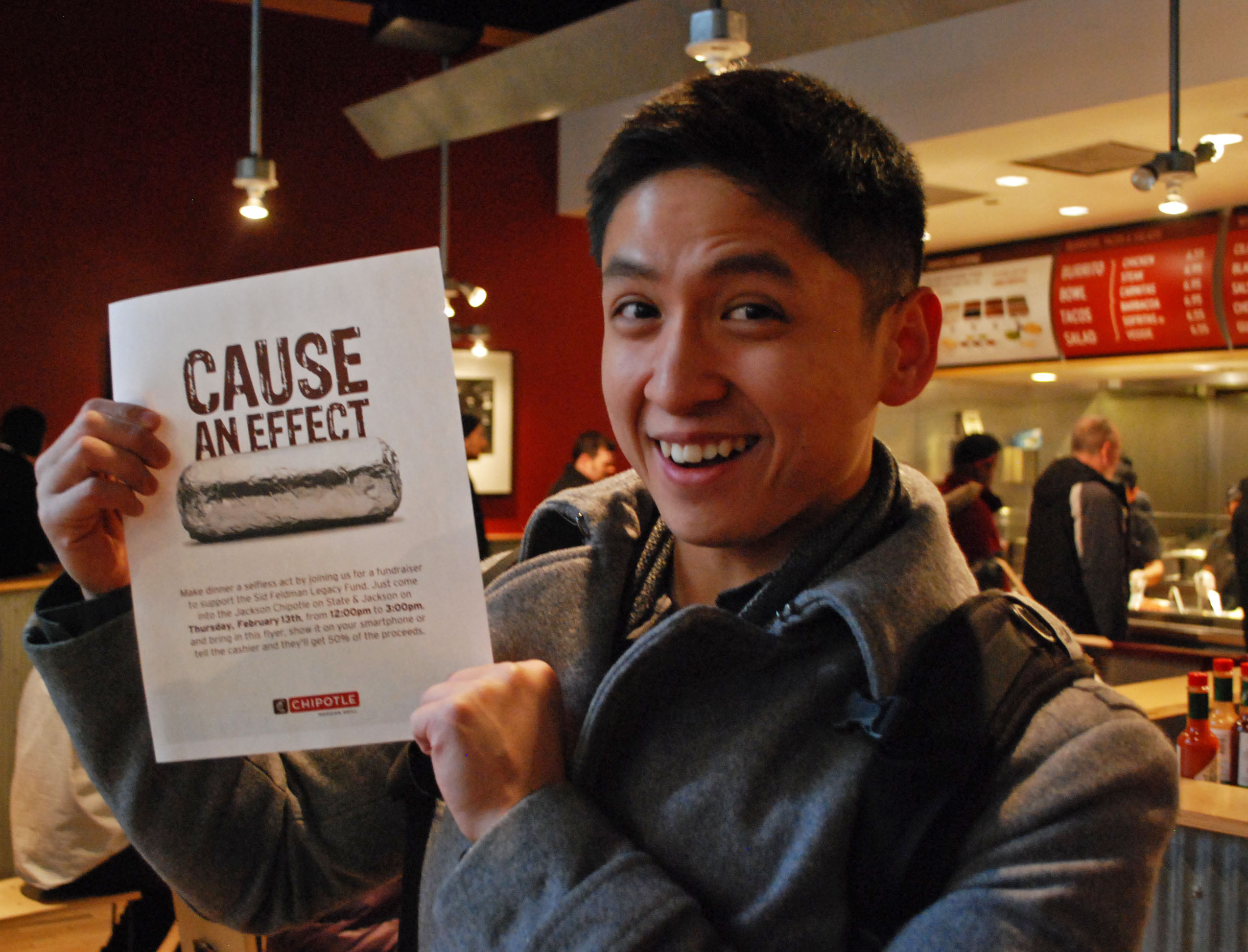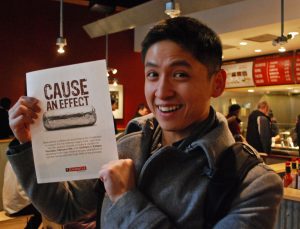
by jlansber | Oct 8, 2014 | Scholarly Pursuits
 Why Do We Buy What We Buy?
Why Do We Buy What We Buy?
Why will you buy a T-shirt for $29.99, but not $30? Who buys the bizarre items—for example, a replica of Gandalf’s staff from “Lord of the Rings”—offered in the airline magazine SkyMall?
These and other questions are pondered by Assistant Marketing Professor James Mourey in his book, “Urge: Why You Really Want What You Want (And How to Make Everyone Want What You’ve Got).”
“It turns out that knowing who buys what or why people buy isn’t nearly as straightforward as you think,” Mourey writes. “Some people buy products because they like them.
Others buy products because other people like them. People often buy products they don’t need (we’re all guilty of that), and some even buy products they may not even want…but if we dig a bit deeper, we can start to uncover some systematic consistencies that help us make better predictions about why consumers do the weird things that they do.”
Workplace Bullies Aim at Star and Subpar Performers
 Workplace bullies most often target colleagues who are high or low performers, according to a study co-authored by Assistant Professor of Management Jaclyn Jensen for the Journal of Applied Psychology.
Workplace bullies most often target colleagues who are high or low performers, according to a study co-authored by Assistant Professor of Management Jaclyn Jensen for the Journal of Applied Psychology.
Low performers tend to be the focus of overt hostility, such as yelling, while high performers are more likely to be victimized by subtle aggression, such as backstabbing and sabotage.
“Although good performance is often emphasized,” the study notes, “these results suggest concern for high performers and whether or not they ‘have a target on their back.’” To defuse bullying, managers should avoid performance metrics that compare employees directly and mentor low performers, Jensen and her co-authors suggest.
Fifty Alternatives to Downsizing
“Organizational downsizing fails to achieve two major goals: increases in effectiveness and efficiency,” writes Associate Management Professor Marty Martin in a study he co-wrote for the International Journal of Business and Social Research. “Alternatives are warranted to achieve these two goals without resorting to organizational downsizing.”
Martin and his research colleagues offer 50 alternatives to downsizing, from furlough days and retirement incentives to asking employees, customers and suppliers for their ideas for reducing costs and generating revenue.
“There are times when downsizing is necessary and appropriate. There are also times when downsizing is not the best solution,” the authors note. “These differences should be squarely addressed by the key decision makers within organizations to lay out a decision-making model that includes alternatives.”

by jlansber | Oct 8, 2014 | Faculty Focus
 Zafar Iqbal remembers the exact moment when he discovered the depth of his identity.
Zafar Iqbal remembers the exact moment when he discovered the depth of his identity.
He was a teenager in the 1980s living in the pensioners’ paradise of Pune, India, when he turned on his television and saw pop icon Michael Jackson “moonwalk” backward across a stage. It was an image that resonated for Iqbal—he wanted to share in the individuality that he saw in American culture.
Iqbal, an associate professor of marketing at DePaul, says seeing such visions of uniqueness and originality spoke volumes to him as he struggled to find his identity in the formal Indian culture, where familial ties often override individual desires. “I grew up Indian,” Iqbal says, “but, in my mind, I’m more American because I always wanted to be an individual.”
Today, Iqbal is helping DePaul students, faculty and alumni discover their identities, both globally and professionally. Because of his cross-cultural experience, Iqbal was tapped by university officials to spearhead DePaul’s educational exchange initiatives with Symbiosis International University in Pune. To date, more than 100 students have traveled to India with Iqbal and Marketing Instructor Luis Larrea to attend classes, visit businesses and nonprofits, meet students and faculty, and learn about Indian culture. Since the partnership with Symbiosis began last year, several DePaul graduates are now working with the likes of Amazon and Groupon on their Indian-focused business initiatives.
When he’s not traversing the globe helping members of the DePaul community live and work in India or teaching business classes, for which he has won multiple teaching awards, Iqbal is conducting essential research for marketing professionals. Currently, he’s working on a large-scale research project to identify and categorize different types of marketing careers.
“There’s not really much (information) out there about what different types of marketing careers exist today,” says Iqbal, noting that the field has expanded rapidly beyond advertising and sales in recent years. According to Iqbal, the job title of marketer is an opaque banner that obscures a host of extremely diverse job types.
Iqbal surveyed 400 DePaul marketing alumni about their careers to develop a career profile for what he has defined as the 14 categories of marketing jobs. “The research will serve as a repository for current students or alumni to understand the different job types that are in marketing and visualize a day in the life of those job types,” Iqbal says.
Decades ago, Iqbal came to the United States seeking his true purpose. Now, he spends his days helping DePaul students and alumni find theirs. Iqbal says, “This is not work, this is a mission.”

by jlansber | Oct 8, 2014 | Giving Back

Ryan Daliege (BUS ’11)
When the Many Dreams, One Mission Campaign for DePaul University officially closed on June 30, gifts had topped $333 million, making it the largest fundraising effort in the history of the university.
“This Campaign has built a stronger DePaul,” says the Rev. Dennis H. Holtschneider, C.M., president of DePaul University. “Donors understand DePaul’s commitment to providing an excellent education to our students. Thanks to them, DePaul will continue to be able to attract and educate talented students from a wide array of backgrounds.”
Overall, Campaign giving to the business college surpassed $113.8 million. “Alumni and friends of the college who responded to this Campaign helped us to strengthen our faculty and our programs, our learning environments and tools, and our ability to help students fund their education,” says Ray Whittington, dean of the Driehaus College of Business.
Alumnus Richard H. Driehaus (BA ’65, MBA ’70, DHL ’02), the investment pioneer and philanthropist whose name now graces the college, made a historic $30 million gift to support an endowment fund to attract and retain top business faculty. The shortage of PhD educators needed to provide a high-quality education puts a premium on the salaries they can command and contributes to the challenge of keeping tuition costs in line. Recognizing this need, Driehaus endowed the fund to help DePaul remain nationally competitive and encourage other generous alumni to contribute so that incoming students can have the excellent classroom experiences they remember so fondly.
Campaign gifts also enabled the expansion of the business school’s Finance Lab, a virtual trading room that symbolizes the school’s innovation and academic excellence in blending leading-edge theory with real-world practice. The lab supports graduate and undergraduate courses in portfolio management, risk management, investment, financial engineering and quantitative methods by providing Bloomberg Terminals with live financial market information as well as other data sources and analytical tools.Additional donor support will enable the college to keep up with technological innovations and expand its business facilities and career services.
More than $106 million in new scholarship funding was raised during the campaign. Ryan Daliege (BUS ’11) expresses his gratitude for the generosity of Campaign donors:
“DePaul provided me with an excellent education in finance, but it never could have happened without my scholarship,” says Daliege, who is back at DePaul in the MBA program while working as a financial advisor for Ayco Company, a Goldman Sachs company.
DePaul thanks its many Campaign donors and invites other grateful alumni to continue the momentum of this historic fundraising Campaign.

by jlansber | Oct 8, 2014 | Alumni Profiles, Online Extras
 Corliss Garner (’96 BUS) relished her years as an undergraduate studying finance at DePaul University. Garner, senior manager of Diverse Markets and Community Affairs at BMO Harris Bank, says the opportunity to work full time while attending a well-respected university in the heart of downtown Chicago was a gift. Yet, after graduation, she drifted away from her alma mater.
Corliss Garner (’96 BUS) relished her years as an undergraduate studying finance at DePaul University. Garner, senior manager of Diverse Markets and Community Affairs at BMO Harris Bank, says the opportunity to work full time while attending a well-respected university in the heart of downtown Chicago was a gift. Yet, after graduation, she drifted away from her alma mater.
But in 2008, when a colleague at her bank mentioned an opening on the advisory board for DePaul’s Coleman Entrepreneurship Center, Garner seized the opportunity.
“Becoming a board member at the Coleman Center reintroduced me to DePaul,” says Garner. “I learned a lot about what was happening at DePaul, including about the entrepreneurship program, as well as other programs at the university.”
During her time with the center, Garner worked with Scott Young, chair of DePaul’s Department of Management, and several other professors, academic staff members and civic leaders. She says she was impressed by DePaul’s commitment to entrepreneurship, leadership and diversity.
When officials from the Chicago Housing Authority approached Garner about potential institutions to cohost the CHA’s summer leadership and financial literacy program for high school students, Garner instantly thought of DePaul and Scott Young, she says. “I knew about DePaul’s commitment to leadership and management and I thought they could lend some value to the CHA’s program.”
Hosted by the college’s Department of Management, taught by DePaul faculty, sponsored by BMO Harris Bank and coordinated by the CHA, the Financial Literacy and Leadership Institute held at the Driehaus College of Business in July offered teens who live in CHA housing a breadth of knowledge. The program featured skill-building lectures, field trips to financial institutions such as the Federal Reserve Bank of Chicago, and guest speakers that included Stedman Graham, chairman and CEO of S. Graham & Associates, and John W. Rogers, Jr., CEO of Ariel Capital Investments LLC. The program culminated with a formal graduation and luncheon.
More than 300 students applied to the program, and the students selected were chosen based upon their academic achievement and leadership potential. They were also paid for their participation, thanks to a generous grant from BMO Harris Bank.
Garner says CHA officials have been singing the praises of the program and DePaul’s commitment to it.
“The feedback has been phenomenal,” Garner says. “They were really impressed with the DePaul faculty who worked with the kids over the summer. I received nothing but great feedback and when I attended the wrap session and heard the students present. I was thoroughly impressed.”
Garner said she is looking forward to next year’s program and seeing the relationship deepen between DePaul, the CHA and BMO Harris.

by jlansber | Oct 8, 2014 | Online Extras
 By Jennifer Leopoldt
By Jennifer Leopoldt
A culture of giving back is built into DePaul University’s mission. In one undergraduate marketing class at the Driehaus College of Business, that idea is also part of the curriculum.
Students in MKT 377: Fundamentals of Sales & Networking learn and practice sales concepts by “selling” for the Sid Feldman Legacy Fund, which creates scholarships for Chicago Public Schools students to attend DePaul. The fund is named after Chicago businessman Sid Feldman, who believed in the power and necessity of education.
“Through this project students not only learn to sell and to provide financial means for someone to attend DePaul, but they come to the realization that they could truly make a difference in a person’s life,” says Adjunct Professor Clancy Ryan (BUS ’96, MBA ’02), who created and teaches the class each quarter and is the director of student relations for DePaul’s Center for Sales Leadership.
Early on, students in MKT 377 would pitch for DePaul’s sales programs or for community partners, such as StreetWise. The class switched to promoting the scholarship fund in winter 2010 and now has a yearly goal of raising $75,000 and funding two partial scholarships. For Fiscal Year 2013-14, ending with the 2014 spring quarter class, MKT 377 students raised $109,979.62.
Students Helping Students
The class introduces sales concepts and challenges students to polish their skills through individual and group work. Each quarter, students break into teams of four and are mentored by a sales team manager, a former student who completed the same class. Bringing alumni into the classroom allows students to learn from someone who has been in the same situation.
“It’s this idea of students mentoring students who are helping students,” explains Sarah Laggos (CSH ’05, LAS MA ’07), who began co-directing the fund while she worked at the Center for Sales Leadership. Now Laggos remains hands-on with managing the fund while being based in California as Alumni, Annual Fund & Corporate Relations Director at Santa Rosa Junior College.
Zaharoula Asimos (BUS ’12) was a sales team manager for four quarters after graduating. She has helped to coach the sales team leaders and serves on the effort’s advisory board. She says she appreciated how Ryan led class by example: “He showed us that you can have a corporate job and do something you love on the side, for the pure passion in your heart.”
Sales team manager Semir Delic (BUS ’11) returned because he believed in the fund and the skills the class taught him. “Everything that I learned in class I was able to apply in the real world while helping other students attend DePaul,” he says.
The advent of sales team managers shows how the course is constantly changing. One year when Ryan taught an MBA-level course on leading business development, he asked the graduate students how they would lead a team of undergraduates to success in a fundraising project. That feedback was implemented into MKT 377. In addition, each quarter the sales team managers are asked to discuss what does and doesn’t work so the course can continue to adapt.
Raising Money, Learning Lessons
Just like a sales force for a company, each student in class is given a sales quota. For FY13-14, the goals were higher: Each student had to bring in $300, with $150 raised individually and $150 raised with their teams. Within four years, the per-student fundraising average has more than doubled, from $220 in 2010 to $537 last year.
Students can raise money however they see fit, usually in a combination of pitching to friends and family and running team events. Those events can be anything from special sales days at local restaurants, such as the Chipotle nearest DePaul’s Loop Campus, to bake sales or other ideas. The challenge comes in picking something that can be implemented in just 10 weeks.
Students see the difference they’re making when past scholarship recipients—now DePaul students themselves—come to class and talk about what receiving the Sid Feldman scholarship meant to them.
“That is the thing that flips the light bulb on: These are real students at DePaul, and without this scholarship they would not be able to be here,” Laggos says. Videos of scholarship recipients also are available on the fund’s website.
Koemi Valencia (BUS ’14) says being a sales team manager is a learning experience, one where she can learn from the students while also helping them succeed. “Having that dual-learning relationship while keeping this amazing cause alive—helping CPS students go to college—is almost an invaluable experience.”
Even as the professor, Ryan says he gains new insight from each class. “I tell the students that they’ll teach me more in 10 weeks than I’ll ever be able to teach them.”

 Why Do We Buy What We Buy?
Why Do We Buy What We Buy? Workplace bullies most often target colleagues who are high or low performers, according to a study co-authored by Assistant Professor of Management Jaclyn Jensen for the Journal of Applied Psychology.
Workplace bullies most often target colleagues who are high or low performers, according to a study co-authored by Assistant Professor of Management Jaclyn Jensen for the Journal of Applied Psychology.






